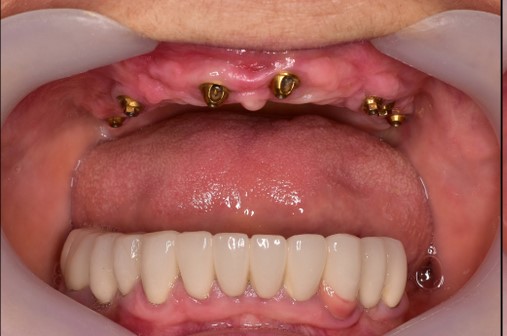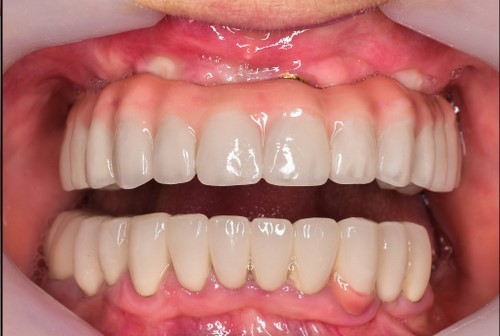Dental Implants
Types of dental implants
There are many types of dental implants, and choosing the right type depends on the health of the jaw bone, the number of teeth to be replaced, and the patient’s preference.
Preparation of the jawbones
In this way, the doctor removes the diseased teeth, which requires spending a period of time up to three months in order to heal the jawbones after this process. The second step is the cultivation of the titanium root in the jawbones. Artificial, depending on its location with the mouth and the load that it can withstand. The time between the removal of diseased teeth, the transplant process depends on the type of tooth removed, and the number of replaceable roots.
– Artificial teeth placement :
After implanting the titanium root, and during the healing of the jawbones of this process, a patient with a temporary temporary removal of dental teeth, or a bridge for three to six months, who must be removed and washed every night to maintain oral hygiene, is placed in the patient. After the complete healing, the doctor implants permanent teeth After biting her to shape the patient’s teeth and jaw.
– Rapid dental implants :
This method is used when the residual space from dislocated diseased teeth is smaller than the usual size of the implanted teeth, in which case, the implanted tooth can weld with the original teeth in the area of the removed tooth, and is permanent.
Advantages of dental implants
Improving the external appearance of the mouth : In particular, the implanted dentures are very similar in appearance to the natural teeth.
Stability of the teeth : where some people, who ride the bridges and crews, fear that their teeth will fall and feel embarrassed in front of others. As for dental implants, they give the patient safety when speaking or laughing, because the teeth implanted in the gums are fixed, and they cannot fall off easily.
Ease of chewing: The person does not feel discomfort while eating all kinds of food, nor will he feel any pain, and he will be able to bite into the food with ease.
Preserving the original teeth : the rest of the original teeth are still removed during implantation, as is the case with the installation of the dental bridge, but many of the patient’s teeth are kept.
Long-term dental health : The implanted teeth are hardened thanks to the durability and strength of the artificial roots used in agriculture, which last for many years, and if a person takes good care of them, they will remain valid throughout their life.
Do not cause tooth growth to decline or increase jaw bone erosion : Dental implants are a good way to reduce jaw bone regression.
Scalability : Many scientific and medical developments are providing the field of dental implants with materials and tools of high medical quality, which increases the chances of a successful dental implant.
Disadvantages of dental implants
• The need for continuous cleaning of the mouth and teeth, and if ignored, acute infections of the mouth may occur.
Lack of adaptation of the implant to each jaw; As the sizes and density of the jaw bones vary, they are not suitable for everyone. As someone who suffered a blow to the face.
• Loss of feeling by some things by the teeth, due to the puncture of the jaw, and the failure of the prosthetic tooth with sensory nerves, but rather with metal.
Side complications from local anesthesia of the jaw, when performing the implant.
The possibility of losing dental implants due to some of the side effects associated with some diseases of the jaw; Like periodontitis.
• The jaw was subjected to additional problems. Because of the loss of bone and the roots of the teeth, due to the loss of implanted teeth, and not when undergoing the transplant.
• Gum fatigue when needed to remove implanted teeth more than once, replace them with another, or make an adjustment to the implant.
• The high material cost of the implant, compared to installing a bridge or dentures.
Benefits of dental implants
• Prevent bone atrophy at the place of the lost tooth, and maintain it.
• Maintaining the remaining natural teeth and maintaining their integrity.
فوائد زراعة الأسنان
تمنع ضمور العظم في مكان السن المفقودة، والمحافظة عليه المحافظة على الأسنان الطبيعية المتبقية وتبقي على سلامتها.
When not to do it ?
- Contraindications to dental implant surgery
- Chronic heart disease and diabetes.
- Smoking more than 10 cigarettes per day.
- Chronic high blood pressure.
- Osteoporosis.
- Radiotherapy.
The appropriate age group for it ?
For men 17 years old. As for women, you are 16 years old, taking into account the completion of the growth of the jawbones.


Do You Want to know more about "Dental Implants"
Talk to one of our experts today
Let one of our experts talk to you about the options, stages of your treatment and also our offers..
زراعة الأسنان
أنواع زراعة الأسنان
هناك العديد من أنواع زراعة الأسنان، و يعتمد اختيار النوع المناسب على صحة عظام الفك، وعدد الأسنان المرغوب استبدالها، والأفضلية عند المريض ترقيع العظام لزراعة الأسنان يجب توافر كمية مناسبة ذات جودة عالية من عظام الفك، وذلك لتثبيت جذر من التيتانيوم، ولكن عند نقص إحدى العنصرين، يقوم المريض بعملية ترقيع العظام المتطلبة في هذه الحالة للزراعة، وبعد هذه العملية التى تحتاج من ثلاث إلى ستة شهور حتى تلتئم، يقوم المريض بعمل الزراعة زراعة الأسنان التقليدية.
تجهيز عظام الفك
و في هذه الطريقة يقوم الطبيب بإزالة الأسنان المريضة، مما يتطلب قضاء فترة من الوقت تصل إلى ثلاثة شهور وذلك لإلئام عظام الفك بعد هذه العملية وتكون الخطوة الثانية هي زراعة جذر تيتانيوم في عظام الفك، ويكون هذا الجذر بمثابة دعامة لسن أو لعدة أسنان صناعية، مُعتمدًا في ذلك على موقعها بالفم والحمل الذى يستطيع تحمله ويعتمد الوقت المقضي بين إزالة الأسنان المريضة، وعملية الزراعة على نوع الأسنان المزالة، وعدد الجذور المستبدلة وضع الأسنان الصناعية بعد زراعة جذر التيتانيوم، وأثناء التئام عظام الفك من هذه العملية، توضع للمريض إحدى أنواع الأسنان الصناعية المؤقتة سريعة الإزالة، أو جسر لمدة ثلاث إلى ستة شهور و الذى يجب إزالتها وغسلها كل ليلة للحفاظ على نظافة الفم، وبعد الالتئام التام يقوم الطبيب بزراعة الأسنان الدائمة بعد أن يلأمها لشكل أسنان المريض وفكه زراعة الأسنان السريعة تستخدم هذه الطريقة عندما يكون الفراغ المخلف من خلع الأسنان المريضة أصغر من حجم المعهود من الأسنان المزروعة، وفي هذه الحالة، يمكن للسن المرزوع أن يلتحم مع الأسنان الأصلية في منطقة السن المزال، ويكون دائم الثبات.
مميّزات زراعة الأسنان
تحسين المظهر الخارجي للفم : وبخاصة أن الأسنان الصناعية المزروعة تُشابه في شكلها الخارجي إلى حدٍ كبيرٍ الأسنان الطبيعية.
ثبات الأسنان : حيثُ يخشى بعض الأشخاص، الذي يركبون الجسور والأطقم من وقوع أسنانهم، والشعور بالإحراج أمام الآخرين، أما زراعة الأسنان فإنها تمنح المريض الأمان عند التحدث أو الضحك، لأنّ الأسنان المزروعة في اللثة ثابتة، ولا يمكن أن تسقط بسهولة.
سهولة المضغ : لا يشعر الشخص بالإزعاج أثناء تناوله شتى أنواع الطعام، كما لن يشعر بأي ألم، وسيتمكن من قضم الطعام بكل سهولة.
الحفاظ على الأسنان الأصلية : لا تُزال باقي الأسنان الأصلية خلال زراعة الأسنان، ، كما هو الحال مع تركيب جسر الأسنان، بل يتم الاحتفاظ بالعديد من أسنان المريض.
صلاحية الأسنان لمدة طويلة : تتميز الأسنان المزروعة بصلابتها بفضل متانة وقوة الجذور الصناعية المُستخدمة في الزراعة، والتي تدوم لسنواتٍ طويلة، وإذا اعتنى بها الشخص جيداً، ستظل صالحةً طيلة حياته عدم التسبب بتراجع نمو الأسنان أو زيادة تآكل عظام الفك: تُعتبر عملية زراعة الأسنان طريقةً جيدةً للحد من تراجع نمو عظام الفك.
قابلية التطور : الكثير من التطورات العلمية والطبية الحاصلة تمد مجال زراعة الأسنان بمواد وأدوات بجودةٍ طبيةٍ عالية، مما يزيد من فرص نجاح عملية زراعة الأسنان.
عيوب زراعة الأسنان
الحاجة إلى التنظيف المُستمر للفم والأسنان، وفي حال تجاهل ذلك فقد تحدث التهابات حادة في الفم عدم مواءمة عملية الزراعة لكل فك؛ حيث تختلف أحجام وكثافة عظام الفك، فلا تصلح لكل الأشخاص؛ كشخص تعرض لضربة في الوجه فقدان الشعور ببعض الأشياء بواسطة الأسنان، بسبب ثقب الفك، وعدم ارتباط السن الصناعي بأعصاب حسية، بل بمعدن مُضاعفات جانبية ناتجة عن عملية التخدير الموضعي للفك، عند إجراء عملية الزراعة احتمالية خسارة الأسنان المزروعة بسبب بعض الأعراض الجانبية المُصاحِبة لبعض الأمراض في الفك؛ كالتهاب دواعم السن تعرّض الفك لمزيدٍ من المشاكل الإضافية؛ بسبب فقدان العظم، وجذور الأسنان، وذلك عند فقدان الأسنان المزروعة، وليس عند الخضوع لعملية الزراعة أنهاك اللثة عند الحاجة لإزالة الأسنان المزروعة أكثر من مرة، واستبدالها بأُخرى، أو إجراء تعديل على عملية الزرع التكلفة المادية العالية لعملية الزراعة، بالمقارنة مع تركيب الجسر أو أطقم الأسنان.
فوائد زراعة الأسنان
تمنع ضمور العظم في مكان السن المفقودة، والمحافظة عليه المحافظة على الأسنان الطبيعية المتبقية وتبقي على سلامتها.
متى لايجب القيام بها ؟
- موانع جراحة غرس الأسنان.
- أمراض القلب و السكري المزمنة.
- التدخين أكثر من 10 سجائر يوميا.
- إرتفاع ضغط الدم المزمن.
- هشاشة العظام.
- العلاج الإشعاعي.
الفئة العمرية المناسبة لها ؟
بالنسبة للرجال من عمر 17 سنة، أما السيدات فابتداءً من 16 سنة ويراعى في ذلك اكتمال نمو عظام الفكين.

